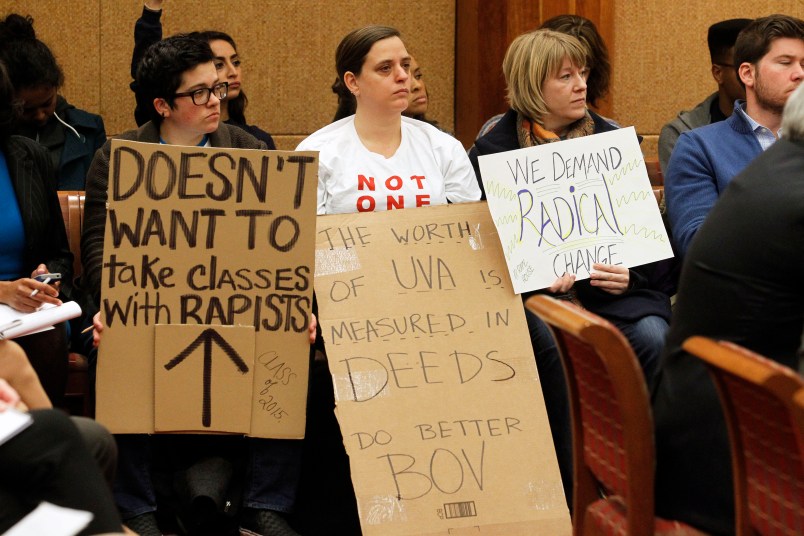Of the many disturbing details in Sabrina Rubin Erdely’s Rolling Stone expose of the poor administrative response to sexual assault reports at University of Virginia, one detail is shaping up to be the most controversial: Erdely’s accusation that the school used a soft-handed, even feminist-sounding approach to make the rape accusations disappear. Focusing on Dean Nicole Eramo, head of UVA’s Sexual Misconduct Board, Erdely lays out a pattern wherein victims who report are given no real guidance, on the grounds that it might seem too pressuring, and, as a result, most choose not to report. Erdely suggests that, well-meaning as the neutral approach may be, the result is “coddling the victim into doing nothing.”
The story has touched upon one of the biggest conundrums—you may even say contradictions—of the feminist response to the problem of sexual assault. Feminists rightfully point out that very few rapists face criminal or even civil penalties for their behavior. Part of the reason for this is that victims are often reluctant to report. But one of the obvious solutions to this reluctance, putting pressure on victims to report by invoking their sense of civic duty, is seen by feminists as completely off-limits and possibly even traumatizing. The result, Erdely argues, is that feminists are unwittingly contributing to an atmosphere where rapists can act with impunity, knowing no one is going to push their victims to call the cops on them.
Many feminists deny there’s a contradiction here, trying to claim that not pushing women will result in more convictions in the long run. “If students feel that we are forcing them into a criminal or disciplinary process that they don’t want to be part of, frankly, we’d be concerned that we would get fewer reports,” associate VP for student affairs Susan Davis told Erdely. But it’s also hard to deny Erdely’s numbers: Out of 38 rape reports given to Erdely, 29 reports “evaporated.”
For some, however, the trauma of being pressured to report sounds worse than the fear of letting rapists get off scot free. Letters to the editor of The Cavalier Daily in support of Dean Eramo sounded this note. “At the time, I was scared and I felt alone and I was in no position to pursue legal or University action,” wrote one survivor. “Autonomy—regaining a sense of control and choice—is critically necessary for recovering from rape. It makes for a messy justice system, but is integral to healing from trauma,” writes another. These are persuasive points, but sometimes being left too much to your own devices can leave people feeling unsupported and afraid.
I was sexually assaulted nearly two decades ago. Multiple people in my life were insistent that I report, persuasively arguing that if the assailant wasn’t held accountable now, he would likely do it again to someone else. So I reported. And while it was not fun, it was not nearly as terrifying as I feared it would be.
Most of the women in the UVA story weren’t as lucky as me. I had a strong support system and a local police department that was actually trained well in handling rape accusations. However, my experience suggests that many rape victims are out there who not only won’t be traumatized by a little nudging, but who may reap emotional benefits from fighting back. It’s important to be sensitive to those who are legitimately afraid to report, but we can find a way to do that without leaving behind those who need extra help to feel comfortable reporting.
Perhaps rape victims need to have more counseling about the consequences of their choices, even while leaving the final decisions to them. Perhaps there’s a way to phrase our encouragement of reporting without sounding like we’re pressuring. Maybe there are tools to help suss out which victims can be encouraged to report without traumatizing them, instead of simply giving a bunch of options to a victim and letting her try to figure it out on her own.
This delicate process is not going to get any better if feminists continue to sidestep these questions. There’s probably a whole world of ways to deal with this conundrum outside of simply leaving victims with a bunch of options and no guidance for fear of stepping on their toes. But we won’t know until we have the discussion.
Amanda Marcotte is a freelance journalist who writes frequently about liberal politics, the religious right and reproductive health care. She’s a prolific Twitter villian who can be followed @amandamarcotte.







The status quo amounts to pressuring victims to allow rapists to feel encouraged to rape again. One has to wonder how much, if any, encouragement is given to victims in the form of strong assurances that they will be supported by the school if they decide to report the rapist to the police.